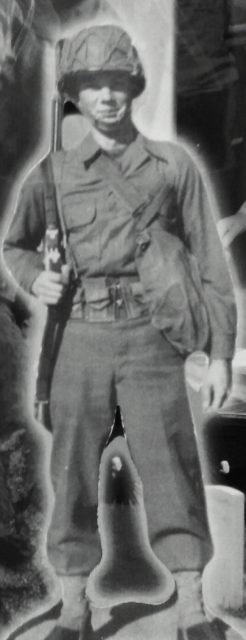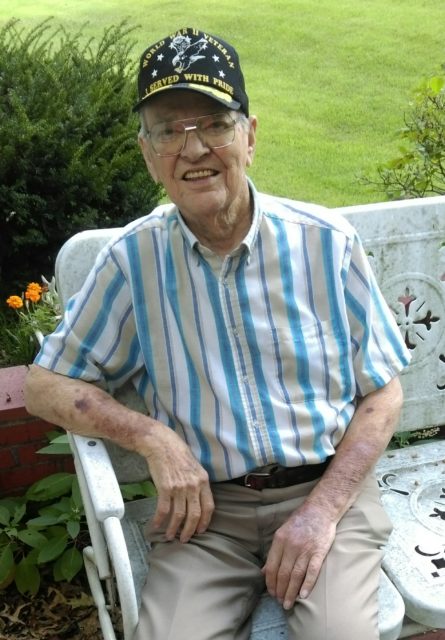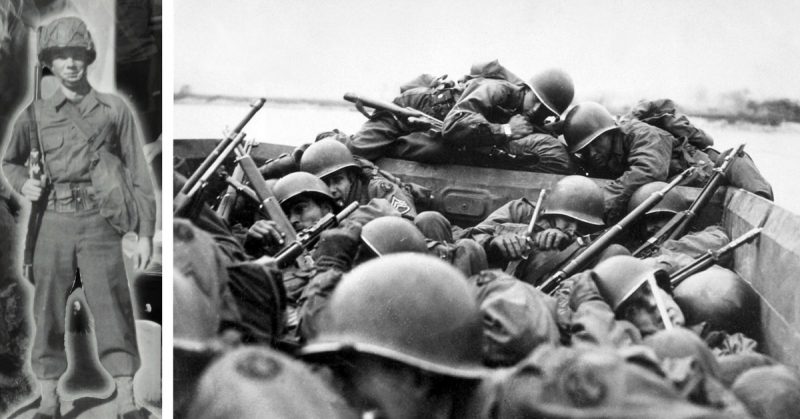War History online proudly presents this Guest Piece from Jeremy P. Ämick, who is a military historian and writes on behalf of the Silver Star Families of America.
William Kromer mirthfully recalls that when graduating from high school in Lacrosse, Wisconsin, in the spring of 1944, he had entered the waiting game and fully realized the likelihood of being drafted into the military for WWII service. In preparation for this imminent circumstance, he made the decision to try to enlist in the U.S. Navy.
“When I went through all of the tests for the Navy, they found out I was color blind and I couldn’t enlist,” said Kromer. “After that, I just waited until I was drafted, which wasn’t too much longer,” he chuckled.
The draftee became a member of the U.S. Army on September 27, 1944 and, following a brief period of induction at Fort Sheridan, Illinois, was sent to Camp Fannin, Texas, for basic infantry training. It was there, the veteran explained, that he and scores of other young recruits had their training shortened because of events unfolding in Europe.
“When the Battle of the Bulge took place (beginning in mid-December 1944), they folded up our operation because they needed us overseas as replacements,” Kromer recalled. “They shipped us out of New York on the Queen Elizabeth—nothing but first class all the way!” the veteran jokingly remarked of their spartan accommodations aboard the ship.
He added, “There were so many people on the ship, they were only able to feed us twice a day and it seemed like there was a continuous line of soldiers going through the chow line. The mess hall was actually set up in the area of the ship that had once been the swimming pool.”

Arriving in Europe in mid-February 1945, the Battle of the Bulge had ended but he and his fellow soldiers were soon traveling across France to meet up with various units in dire need of replacement soldiers. Kromer noted that he was quickly placed with Company G, 354th Infantry Regiment of the 89th Division shortly after they had crossed the Moselle River and were fighting their way toward the Rhine River.
“The night before I got to my new company, they had a couple of guys that had been killed in their foxholes by a (German) sniper,” Kromer said. “After the captain told me that, I made sure that I was digging my foxhole as deep as I could go!” he affirmed.
As the 354th prepared to cross the Rhine during the latter part of March 1945, often under the camouflage of an acrid smokescreen or the cover of the evening’s darkness, it was not enough to fully mitigate the persistent threat from German troops on the other side.
“We went across near St. Goarhausen on assault boats that were basically made out of plywood,” Kromer explained. “There was about 12 men going across on each boat with 2 to 3 guys that took it back and forth.” With perceptible heaviness, he added, “When I went across, one guy got shot in the ear and another took a bullet in his shoulder.”
When the Rhine crossing was finally accomplished—despite the occasional pockets of lingering resistance they continued to encounter—Kromer and his fellow soldiers sensed that the war was drawing near an end as the “opposition was kind of thinning out.”
The regiment soon made their movement into central Germany “through Wiesbaden and then east toward Frankfurt and onto the Frankfurt-Berlin autobahn,” wrote an unidentified author in a regimental history that was distributed to the soldiers of the regiment after the war.

“We were in Zwickau, Germany, when the war ended,” said Kromer. “Prior to this, we had been guarding a bridge into the town … and the town was full of German soldiers.” He noted, “As soon as the Germans got word that the war was over, they came to us to surrender and there were so many turning themselves in that we couldn’t handle it at first.”
Throughout the weeks that followed, the veteran remained in Germany as part of the occupational forces and was scheduled to transfer to the South Pacific to help with the war against Japan; but when the atomic bombs were dropped in August 1945 and Japan surrendered, Kromer was sent to Styer, Austria to help guard prisoners of war.
“While I was over there, I tried to visit my grandparents who were living in Germany,” he said. (Kromer’s father was first-generation American.)
“I got as close as 75 miles from them but they were living in a sector controlled by the Russians so I never did get to see them.”
In the summer of 1946, the veteran had earned enough points to return to the United States and he received his discharge from the Army on July 26, 1946. In the years after the war, the veteran moved to Jefferson City, Missouri, married, helped raise three children and worked more than 40 years at the former Hotel Governor.
The Second World War was certainly one of the most exciting periods in Kromer’s years of experiences, but rather than dwell on the fleeting moments of the time he spent in uniform many decades past, he chooses to view his service to the nation in a most humble, casual manner.
“I just figured that I had to fight for the country and try to survive to raise a family someday,” he calmly admitted. “I was just one of many basic infantry guys over there taking orders and doing whatever they said to do.”
With a wry grin, he concluded, “I was lucky because there’s several times that I could have been killed, I guess … if whoever we were fighting against knew how to shoot a little straighter.”
